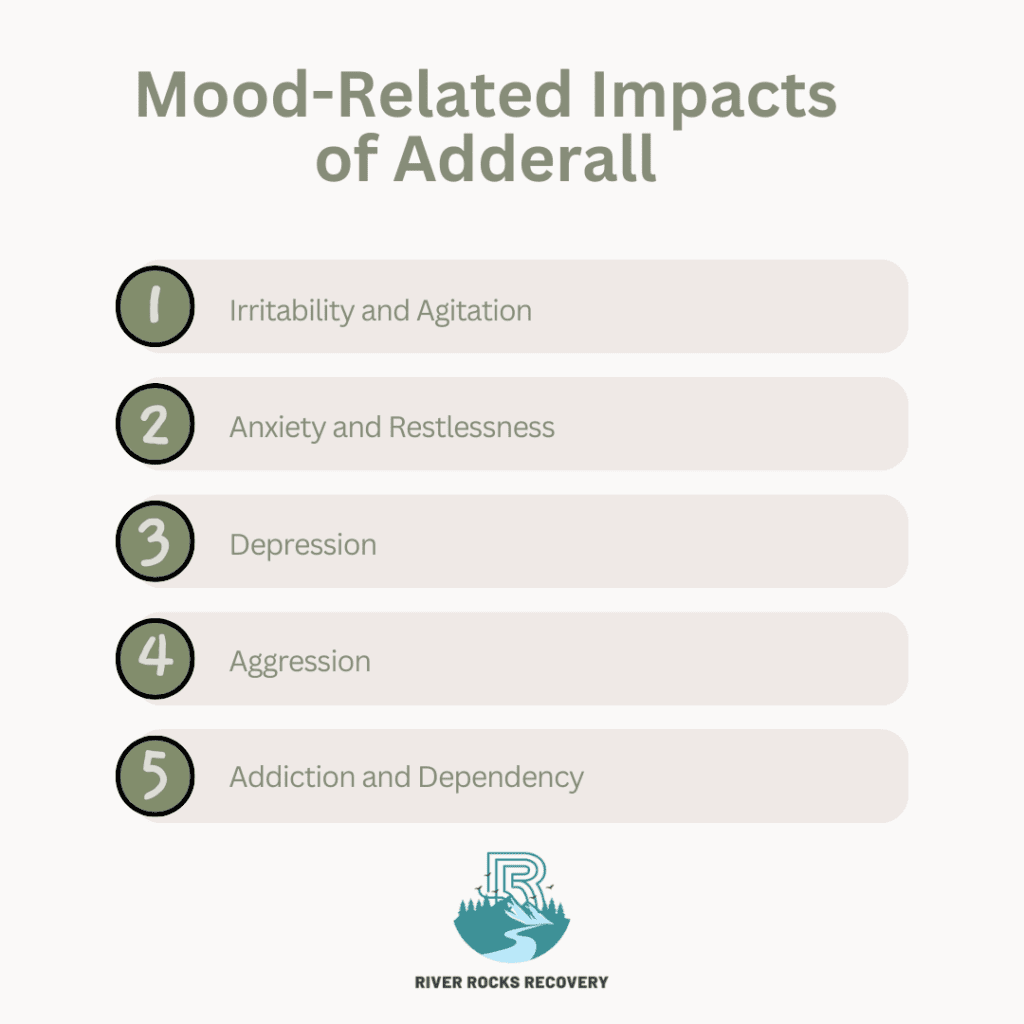Adderall has gained widespread recognition as a treatment for narcolepsy and Attention Deficit Hyperactivity Disorder (ADHD). Because of its well-known tendency to increase alertness, focus, and concentration, Adderall is frequently prescribed—and sometimes even abused—due to its cognitive-enhancing benefits.
Thus, it’s important to realize, though, that Adderall affects both your mood and your capacity for concentration. Here we’ll talk about what to expect from Adderall use and how it may affect emotional health. So, let’s scroll down this blog and find the details.
How Does Adderall Work and What Is It?
Adderall is a combination of amphetamine and dextroamphetamine that makes up the stimulant. These substances raise the brain’s concentrations of norepinephrine and dopamine, two neurotransmitters important for reward circuits, motivation, and attention. Adderall is a very useful medication for treating ADHD symptoms since it works by boosting these brain chemicals, which also aid with focus and impulse control.
Nevertheless, Adderall can also have a significant impact on mood due to its effects on brain chemistry. Depending on the dosage, length of usage, and whether the drug is being taken as directed or abused, these effects can differ significantly.
What to Expect from Adderall
Adderall is a stimulant that combines two drugs: amphetamine and dextroamphetamine. Its primary function is to increase the levels of neurotransmitters like dopamine and norepinephrine in the brain, improving concentration and reducing impulsivity. For those with ADHD, this effect can feel stabilizing and help with managing everyday tasks. However, for individuals who misuse Adderall or take it without a prescription, the effects can be much different.
Common Short-Term Effects
- Increased energy and alertness: Adderall helps you stay awake and focused for extended periods.
- Improved focus: Many experience heightened concentration, especially on tasks that require prolonged attention.
- Elevated mood: Some report feeling euphoric or overly optimistic after taking Adderall, but this effect can quickly fade.
How Adderall Impacts Your Mood
Please note that Adderall can cause both positive and negative impacts on your mood and overall well-being. So, make sure you’re consuming its dosage as prescribed by the doctor. Now, let’s see the positive and negative effects:
Positive Effects:
Taking Adderall as directed by a doctor can help people with ADHD or narcolepsy become more focused, productive, and mentally clear overall. These advantages have the potential to improve mood since they tend to make daily chores feel more feasible due to less distractibility and improved organization. The following are a few such advantages:
- Enhanced Motivation: By activating the brain’s reward system, Adderall can enhance motivation. Previously uninteresting or daunting tasks can be made more interesting and attainable, which enhances well-being and a sense of achievement.
- Better Mood Stability: Adderall, especially for those with ADHD, can help stabilize mood swings by controlling brain chemicals like dopamine. Numerous users report feeling less agitated or prone to frustration, as well as calmer and more concentrated.
- Enhanced Confidence: A natural increase in self-confidence follows increased productivity and focus. Being able to accomplish objectives and finish activities quickly can boost one’s self-esteem, which has a good effect on mood.
Negative Effects:
Although Adderall has many advantages, it’s crucial to understand that it can also have negative effects, especially when it comes to mood. Depending on the way the body responds to the medicine, these side effects can vary from moderate irritation to severe mood swings.
- Irritability and Agitation: Due to its stimulant properties, Adderall occasionally makes people feel jittery, restless, or apprehensive.
- Anxiety: While Adderall might have a relaxing effect for some people, it can also make others feel more anxious.
- Depression: Long-term Adderall usage or abuse may occasionally exacerbate depressive symptoms.

Mood-Related Impacts of Adderall
While the short-term effects of Adderall might seem beneficial, the drug can significantly alter your mood over time, especially if taken in higher doses or misused. Some of the most common mood-related impacts include:
- Irritability and Agitation: As the effects wear off, individuals may experience heightened frustration and mood swings. This is particularly common in those using Adderall without medical supervision.
- Anxiety and Restlessness: Adderall’s stimulating effects can increase anxiety levels, making you feel jittery or on edge. This is especially true for people prone to anxiety disorders.
- Depression: Over time, Adderall can deplete the brain’s natural production of dopamine, leading to feelings of sadness or depression, particularly when the drug is not in your system.
- Aggression: Some individuals may exhibit heightened aggression or confrontational behavior, which can strain relationships and lead to personal conflicts.
- Addiction and Dependency: The euphoric high that some people seek from Adderall can quickly lead to misuse and addiction. This dependency can exacerbate mood swings, depression, and anxiety.
Long-Term Psychological Effects
Prolonged misuse of Adderall can severely impact mental health, contributing to issues like:
- Severe Depression: Extended use of Adderall can disrupt your brain’s ability to regulate mood, leading to chronic depressive states.
- Paranoia: In some cases, individuals may experience delusions or paranoia, especially when using high doses of Adderall.
- Increased Risk of Suicidal Ideation: The combination of mood swings, depression, and anxiety caused by Adderall misuse can raise the risk of suicidal thoughts, which requires immediate intervention.
The Effects of Dosage on Mood
The way Adderall impacts mood is mostly dependent on dosage. When used as directed, lower dosages can increase concentration and stabilize mood and are generally well-tolerated by most people. Higher dosages, however, particularly when abused, can cause worsened adverse effects like anxiety, agitation, or exhilaration that is followed by a collapse. Mood swings and mental instability can be more likely if you self-medicate and don’t adhere to your doctor’s recommended dosage.
Treatment for Adderall Misuse
At River Rocks Recovery, we understand that overcoming Adderall addiction is not just about breaking physical dependence; it’s also about addressing the emotional and psychological toll it takes. Our Addiction Treatment Programs in Ohio offer comprehensive support, including Cognitive-Behavioral Therapy (CBT) and Dialectical Behavior Therapy (DBT), to help clients manage mood disorders and develop healthier coping mechanisms. Whether you’re seeking an Outpatient Program (OP), Intensive Outpatient Program (IOP), or Partial Hospitalization Program (PHP), we have tailored options to fit your needs.
Finding Balance with Adderall? Get in Touch with River Rocks Recovery!
Are you having trouble adjusting to Adderall’s effects or are you worried about how it will affect your mood? You can discover the ideal balance with the individualized support provided by River Rocks Recovery. Our skilled team of practitioners creates individualized Addiction treatment programs and walks you through each stage of the healing process. To begin your journey toward a balanced existence, get in touch with us right now.
Our Ohio-based Addiction Treatment Center provides an integrated approach, combining medical detox, therapy, and holistic support to ensure a full recovery. With our Addiction Therapy Programs, you’ll learn to navigate the challenges of recovery, heal from the psychological effects of Adderall misuse, and regain control of your life.
Conclusion
Adderall can have profound effects on both your focus and mood. While it’s often prescribed for legitimate medical conditions like ADHD, misuse or dependency can lead to a host of mental health challenges, including anxiety, depression, and even addiction. At River Rocks Recovery, we recognize the complex nature of Adderall misuse and the emotional struggles that often accompany it. If you or a loved one is struggling with Adderall misuse, contact our Addiction Treatment Center in Ohio today and start your journey toward recovery. Call us at: (888) 905-6281 today to know more info on Adderall.
FAQ: Adderall Effects and Mood
What does Adderall do to your mood?
Adderall can significantly alter your mood. Initially, it may elevate your mood, increase energy, and boost focus. However, as the effects wear off, it can lead to irritability, anxiety, and mood swings. Prolonged misuse can contribute to depression and worsen existing mental health conditions.
Can Adderall cause depression?
Yes, prolonged Adderall use can deplete the brain’s natural dopamine levels, leading to feelings of depression. This is especially common when the drug is misused or taken without a prescription.
Can Adderall make anxiety worse?
Adderall’s stimulating effects can heighten anxiety, especially in individuals prone to anxiety disorders. Increased restlessness, nervousness, and tension are common side effects, particularly at higher doses.
How do I know if I am addicted to Adderall?
Signs of Adderall addiction include taking the medication without a prescription, increasing the dose without medical guidance, experiencing withdrawal symptoms when not using the drug, and using Adderall despite negative impacts on your life, such as mood swings or relationship problems.
What should I do if I think I’m addicted to Adderall?
If you believe you may be addicted to Adderall, seek help from a professional treatment center like River Rocks Recovery. We offer comprehensive Addiction Treatment Programs that include Cognitive-Behavioral Therapy, Dialectical Behavior Therapy, and options such as Outpatient Programs (OP) and Intensive Outpatient Programs (IOP) to help you overcome dependency and regain control of your life.
How does River Rocks Recovery treat Adderall addiction?
At our Addiction Treatment Center in Ohio, we use a combination of medical detox, therapy, and holistic support to treat Adderall addiction. Our Addiction Therapy Programs include evidence-based treatments such as CBT and DBT, and we provide flexible care options including Outpatient and Partial Hospitalization Programs to address both physical and mental health needs during recovery.
Can I recover from Adderall addiction without inpatient care?
Yes, many individuals recover through outpatient care, depending on the severity of the addiction. At River Rocks Recovery, we offer flexible programs such as Intensive Outpatient Programs (IOP) and Partial Hospitalization Programs (PHP) that provide the structure and support you need while allowing you to maintain responsibilities like work or school.




























